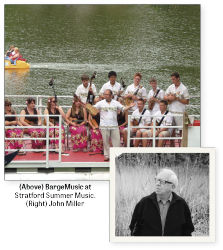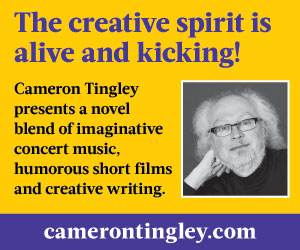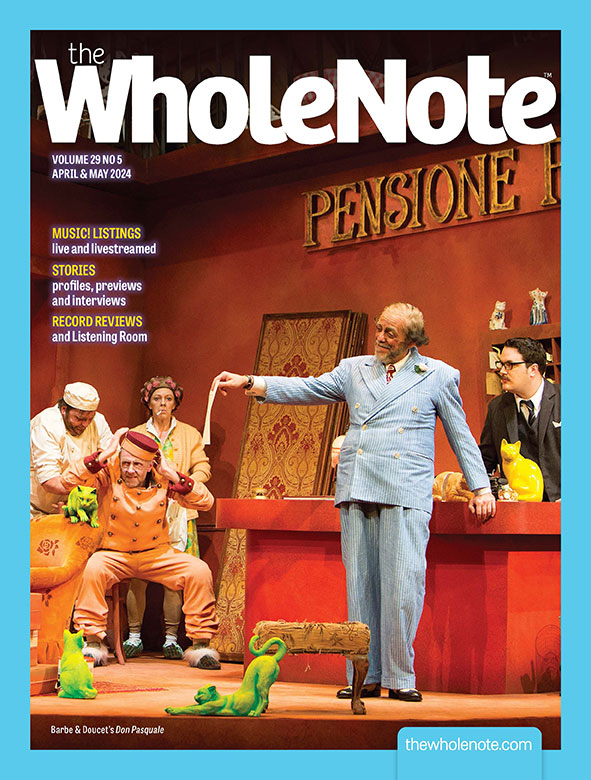![]() "
" So you’re sweet sixteen?” I say to my guest. We’re sitting in The WholeNote office, mid-May – one of those “just-happened-to-be-in-town,” semi-spontaneous conversations that goes better for not having over-planned it. He chuckles. “I hadn’t quite thought of it that way” he says. “I’ve just been telling people we are in our teens. But if someone wants to come along and kiss us with a big fat donation, I wouldn’t say no.”
So you’re sweet sixteen?” I say to my guest. We’re sitting in The WholeNote office, mid-May – one of those “just-happened-to-be-in-town,” semi-spontaneous conversations that goes better for not having over-planned it. He chuckles. “I hadn’t quite thought of it that way” he says. “I’ve just been telling people we are in our teens. But if someone wants to come along and kiss us with a big fat donation, I wouldn’t say no.”
“Anyone particular in mind?” I ask. He fires right back. “If there was, I wouldn’t tell you!”
My guest this day is John Miller, artistic producer from the outset, 16 years ago, of Stratford Summer Music (SSM), that, for six weeks of the summer anyway, grabs a share of the spotlight from the Stratford Festival, the April-to-November theatrical juggernaut that has, over the course of its 60-year existence, completely reshaped the history of one small Ontario town.
“Is the elephant co-operative these days?” I tease. “Or are you guys two solitudes?”
Perhaps it’s the presence of the tape recorder, but he pauses for longer than usual, given his normal free-flowing conversational style. And then: “...I’m only choosing my words carefully” he says “because I don’t want any wrong impression to come out. By saying that we’re in our own spheres it doesn’t mean there aren’t occasions when we cross, or cooperate. But what we realize is they are a $60 million dollar big business, and we’re a $1 million small business, and it’s so easy to get crushed, or overwhelmed. So we tend to want to keep our own separate tracks, so that we can keep our own identity. Because I think it will always be the case that if you say ‘Stratford’ and ‘Festival’ in one breath, people think theatre. Because we started more than four decades behind them, that’s the thing. I often dream of what music would be like if the original concept of music at the Stratford Festival had been allowed to grow instead of being cut off as it was.”
“You mean the days of Louis Applebaum?” I ask. (Applebaum, the Stratford Festival’s resident composer for 43 years, had begun a separate Stratford Music Festival in 1955, two years after the establishment of the Theatre Festival.) Miller lights up. “Absolutely! When Glenn Gould was in charge of the music programming, Peter Pears and Benjamin Britten used to come. Elisabeth Schwarzkopf used to come. Duke Ellington would come. Those were great days.”
Part of the problem, he explains, is that music was deemed by the festival board to be too expensive, and so was cut out. “It is expensive,” he continues. “And it’s a psychological thing. You mount a (theatrical) production. It costs a lot, but it can run for six months. We don’t do that in music. You bring in a great orchestra or singer or somebody and it costs a lot of money, and what do they do? One concert, or maybe two if you’re lucky, and then away they go...But it’s not a case of ‘Oh we’re trying to bring music back.’ We’re not trying any more. We have succeeded in bringing music back, with its head held high.”
“If I’d had to guess, before looking at your website, I’d have thought you’d be making a meal of the ‘Shakespeare at 400’ thing this year,” I say, “But it looks like you’re being quite laid back about it, not whacking it over the head – you have a very diverse program.”
“Well, we’re probably doing the biggest thing in the city in regard to it,” he responds, “because we are bringing the choir from Shakespeare’s own church, the Holy Trinity Church, as the core of our choral programming this year, and they are bringing two programs of music they’ve been building up and singing to people visiting the church in their community. Their vicar is coming, and we’re going to team up with the local Anglican church here, plant trees in both churchyards...and on our lecture series music critic Robert Harris is doing a presentation on Shakespeare and music...and that’s a lot more than the Theatre is doing. So we are in fact carrying the ball on the salute to the 400th anniversary. Mind you, I could have done a whole festival based on that.”
“You could have,” I agree. “And it’s fantastic that you haven’t.”
One distinctive feature of Miller’s abilities as a curator is how deftly he spins multiple themes that weave through the course of a Stratford Summer Music season. For example, the choral strand this year, will also feature Daniel Taylor’s Theatre of Early Music (in a program of great anthems by Handel and Bach titled ‘Let The People Hear’), The Canadian Spotlight (a chorus of professional and semi-professional singers put together for SSM by conductor Mark Vuorinen) which does a full program of Canadian choral works, and the Harlem Gospel Choir, with, as Miller reveals, a significant guest.
“What you probably don’t know yet is that Measha [Brueggergosman] will come and sing with them. Last year we had The Blind Boys of Alabama – a huge success, hundreds of people, we were turning people away – and Ben [Heppner] came and sang with them, and I thought wouldn’t it be fun to carry that sort of spirit on. But who could sing with the Harlem choir? Measha was the natural and she agreed to come.”
"Tell about the other strands this year," I ask, and he obliges with gusto: there’s the always stellar piano series (“I’m really proud of the piano series. I just love piano. That’s part of it”; there’s 7am music on the banks of the Avon; a cabaret series ranging from "Trish O'Callaghan covering Cohen to Alex Samaras doing Sondheim, to Michael Occhipinti and friends doing John Lennon.” There will also be 30 hours of barge music in a wide range of genres; three “Bach walks” in “The Grove” with music supplied by the Charm of Finches flute ensemble and commentary by the local society of field naturalists society “on the double-breasted whatevers and the purple trillium”; Whiskey Jack (who backed up Stompin’ Tom for decades) will play at the local Legion “because I thought, well, where would Stompin’ Tom have played”; one of their trademark restaurant concert series will feature the world of harp music “from classical to celtic to baroque to Paraguyan to Senegalese to contemporary”; …the list, and his delight at all of it, seem boundless.
One element of Miller’s ability to bring about programming coups, like Heppner singing with The Blind Boys of Alabama last year or this year's Brueggergosman/Harlem Gospel Choir collaboration, relates to the formidable and diverse rolodex of musical contacts and musical acquaintanceships he has built up over a decade and a half here at Stratford Summer Music. (“The one part of my job I don’t like,” he says, “is how often I have to say no to people, now.”) Part of it doubtless also stems from previous sojourns with the Glenn Gould Foundation and before that the Canadian Music Centre.
But part of it also stems from a very savvy sense of what one might call the art of the necessary. Which arises from an acutely realistic understanding of the context in which he and SSM must operate. If he does his job right, around 65,000 people every season, who make it to Stratford for something else, will “happen across” SSM, and remember the fact that they did.
“How do you plan for people to stumble across you and how do you ensure that, no matter how long they stick around for, they go away appreciating the scope of the whole thing and the deftness of the weave?” I ask.
“It’s very interesting,” he says. “I am always running into people who say ‘I didn’t know there was a music festival here’ and then I’ll say ‘Well, did you hear the Andrew Collins Trio; did you hear the bluegrass?’ and they’ll say ‘Oh yeah I heard the bluegrass music down on that wonderful floating stage, downtown,’ but they just sort of thought it happened somehow.”
“But that’s the big challenge, isn’t it?” I ask. “Because your passers through, your Stratford Festival attendees, even your SSM regulars, are only going to get a tiny taste of it all, unless they are coming back every weekend or staying the week, which I would think isn’t easy to do given how busy the town is in theatre high-season.”
He pushes back a bit at that: “Well I suppose. But if you went to the Edinburgh Festival, or Ravinia, or any of these places, even if you come for the Stratford Theatre, you know, you don’t get it all at one time. You have to come back, or you take your chance on what has been programmed by some artistic director for the dates when you’re going to be there. That’s the way it is, and as the artistic director you have to understand that. My responsibility is to present you with a cultural smorgasbord at any given moment, so that you can pick and choose from it.”
The trick, he says, is to make sure that there is always a representative mix of ingredients so you come away with a sense of the whole.
Beyond Concertizing: Stratford Summer Music is also becoming an increasingly interesting educational destination, for public and students alike, most notably its TorQ Percussion Quartet residency, now in its fifth year, and a robust Vocal Academy which offers a jaw-droppingly fine ten-day residency to career-edge artists.
“The Vocal Academy is expanded this year,” Miller says, “with new faculty – Krisztina Szabó, Nathalie Poulin and Alison Pybus.” Pybus, he says, is a particularly significant addition. “We felt it was important that these edge-of-career singers have guidance in areas additional to voice. And management is something they need to understand and have insight into. Alison Pybus used to be the director of the vocal division at IMG. So she’s at the top of her field and will join [Michael] Schade and Phillip Addis and Emily Hamper, and Howard Dyck who lectures on oratorio, and Geraint Wynn-Davies who speaks to them about acting.”
Getting in is via a rigorous application process involving submission of recordings and CVs so they can be shipped to Schade, Hamper and Addis wherever they may be; at this point applicants come in from all over Canada, and elsewhere – “The furthest this year was New Zealand” he says. “And we sent posters to every music faculty in the country back in January.” It’s not a full scholarship opportunity but the ten days end up costing around $500, with billeting opportunities and/or housing in the nurses’ residence in town as options. “And of course while they are with us they get tickets to the theatre and everything else that’s going on in the Stratford environment.” The great thing, he adds, is that most of those vocal master classes are open to the public – “Alison Pybus will, for example conduct mock auditions, and then spend private time afterwards, giving feedback and going over each student’s promotional materials.”
Tellingly, the subsidizing of student participation in the Vocal Academy comes from the community itself – a grass roots initiative.
“What is extraordinary to me,” Miller says, “is how the community buys in. After all this time, living in Stratford, you understand how important the arts are, not just for the pocket book but for your own soul. Artists love to come here - 35,000 population, extraordinary restaurants and neighbours. I’m having fun. One heck of a good place, it really is. I am just happy to be lucky enough to do what I do.”
David Perlman can be reached at publisher@thewholenote.com




